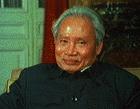Pham Van Dong
|
|
Pham Van Dong (Vietnamese: Phạm Văn Ðồng) (March 1, 1906 - April 29, 2000) was an associate of Ho Chi Minh who helped establish the Indochinese Communist Party. He served as Prime Minister of North Vietnam from 1954 through 1976, and was Prime Minister of reunified Vietnam from 1976 until he retired in 1986.
On May 2, 2000, the Vietnamese Communist Party and the Vietnamese government announced that Mr. Pham Van Dong, former Politburo member, former prime minister, died in Hanoi on April 2, 2000 after several months of serious illness at the age of 94. Commemoration and funeral service were held on May 6, 2000 in Hanoi.
According to the Hanoi official announcement, Mr. Pham Van Dong was born into a civil servant family in Duc Tan village, Mo Duc district, in Quang Ngai province on the central coast on March 1, 1906.
In 1925 at the age of 18, he joined patriotic students to stage a school sit-in to mourn the death of the famous patriotic scholar Phan Chu Trinh. In 1926, he traveled to Guangzhou in southern China to attend a training course run by Nguyen Ai Quoc (later to be known as Ho Chi Minh) before being admitted as a member of the Vietnam Revolutionary Youth Association, the predecessor of the Communist Party of Vietnam (CPV).
In 1929, he worked for the association in Saigon. In the same year, he was arrested, tried by the French colonial authorities and was sentenced ten years in prison.
He served the term in Poulo Condor Island Prison until 1936 when he was released thanks to the general amnesty granted by the government of the Popular Front in France after its electoral success.
He then continued to take part in activities of Ho Chi Minh's Indochinese Communist Party. After Ho Chi Minh rose to power during the August, 1945 popular uprising, Pham Van Dong was appointed minister of finance of the newly established government of the Democratic Republic of Vietnam (DRV). But he had been better known to people outside the country since the time he was appointed the head of the Vietnamese delegation to the Vietnam-France negotiations at Fontainebleau (France) in May 1946.
In May 1954, he was leading the delegation of the Ho Chi Minh government to the Geneva Conference on Indochina. The Vietnamese forces lead by his government had imposed a humiliating defeat on the French at Dien Bien Phu in spite of the latter's substantial support received from the United States.
At the 5th session of the DRV First National Congress, Dong was appointed prime minister. He stayed in this position for the next 32 years until 1987 when his retirement was approved by the 6th Party National Congress.
As an advisor to the Party Central Committee from 1987 to 1997, he often urged the party to have more efforts to stop corruption. He kept giving advice on the similar issues even when he was no more the advisor of the central committee and became so ill that he had to have someone else write down his words on papers.
In general, Mr. Pham Van Dong had been a staunch communist and nationalist leader, the most faithful disciple of Ho Chi Minh and a major figure in Vietnam's fight for independence and unity. Throughout his political career, he tried to maintain his neutral position in the various conflicts within the party.
See also: North Vietnam -- Vietnam War -- Vietnamvi:Phạm VÄn Äá»ng
zh:范文同

